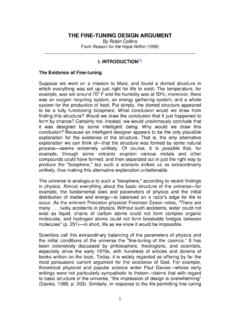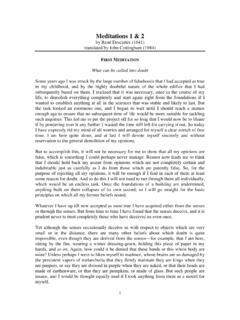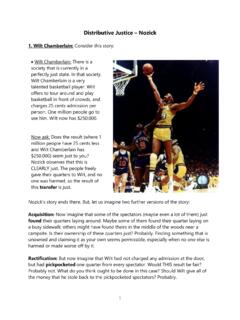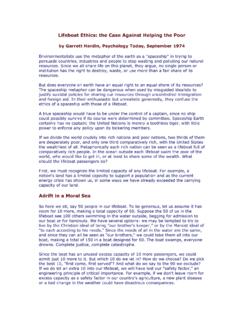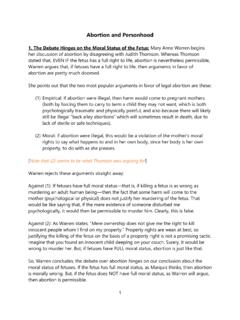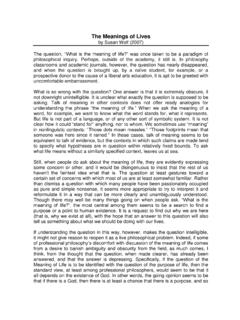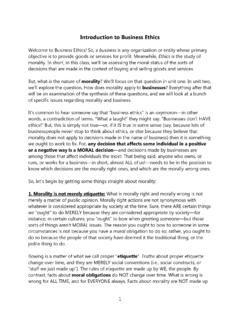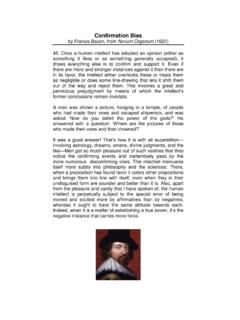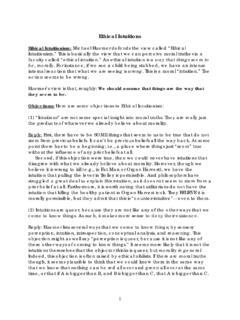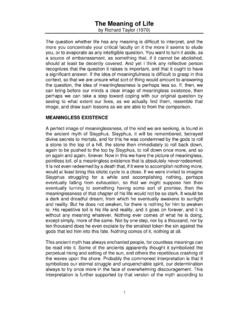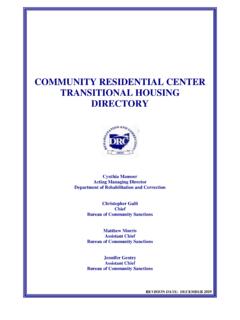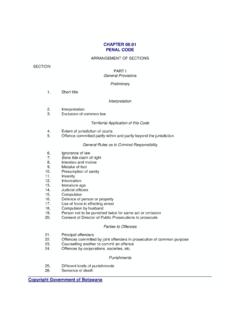Transcription of Is There a Right to Immigrate? - University of Colorado ...
1 Is There a Right to Immigrate? by Michael Huemer (2010). 1. The Immigration Question Every year, close to one million individuals from foreign nations migrate to the United States legally. But many more are turned away. Individuals seeking to enter without the permission of the government are regularly barred at the border, and those discovered in the territory without authorization are forcibly removed. The government expels over one million people from the country each year. Hundreds of thousands continue to try to smuggle themselves in, occasionally dying in the attempt. On the face of it, this raises ethical questions. Is it Right to forcibly prevent would-be immigrants from living in the United States? Those excluded seem, on the face of it, to suffer a serious harm. Why are we justified in imposing this harm? Some reason that, just as a private club may exercise its discretion as to whom to admit or exclude, so a nation-state has the Right to choose whom to admit or exclude.
2 Some believe that we must exclude most would-be immigrants in order to maintain the integrity of our national culture. Others argue that immigrants cause economic hardship for existing citizens that they take jobs from American workers, depress wages, and place an undue burden on social services provided by the state. Some go so far as to warn that unchecked immigration would bring on environmental, economic, and social catastrophes that would reduce the United States to the status of a Third World country. Few would question the state's Right to exclude at least some potential migrants. For example, the state may deny entry to international terrorists or fugitives from the law. The interesting question concerns the vast majority of other potential immigrants ordinary people who are simply seeking a new home and a better life. Does the state have the Right to exclude these ordinary people? In the following, I argue that the answer to this question is no.
3 I shall assume that we are considering ordinary, noncriminal migrants who wish to leave their country of origin for morally innocent reasons, whether to escape persecution or economic hardship, or simply to join a society they would prefer to live in. Though I shall conduct the discussion in terms of the situation of the United States, most of my arguments apply equally well to other countries. My strategy is to argue, first, that immigration restriction is at least a prima facie violation of the rights of potential immigrants. This imposes a burden on advocates of restriction to cite some special conditions that either neutralize or outweigh the relevant prima facie Right . I then examine the most popular justifications offered for restricting immigration, finding that none of them offers a credible rationale for claiming either that such restriction does not violate rights or that the rights violation is justified. This leaves immigration restrictions ultimately unjustified.
4 1. A word about theoretical assumptions. In my view, most general theories or theoretical approaches in political philosophy liberal egalitarianism, contractarianism, utilitarianism, and so on are too controversial to form a secure basis for reasoning. It is not known which, if any, of those theories are correct. I have therefore sought to minimize the reliance on such theories. This does not mean that I assume that all such broad theories are false I. merely refrain from resting my arguments on them. Thus, I do not assume utilitarianism, contractarianism, libertarian rights theory, liberal egalitarianism, nor any general account of harm or rights. Nor do I assume the negation of any of those theories. Instead, I aim to rest conclusions on widely shared ethical intuitions about relatively specific cases. The method is to describe a case in which nearly everyone will share a particular, clear intuitive evaluation of some action, and then to draw a parallel from the case described to some controversial case of interest.
5 This methodology follows a well-established tradition in applied ethics I propose that the approach be applied to the issue of immigration. The approach can, of course, be subjected to criticism, particularly for the weight placed on common ethical intuitions, but this is not the place for a general discussion of the value of ethical intuition. In any event, the intuitive premises I shall rely on are, I hope, much less controversial than the broad philosophical theories of the sort mentioned above, and much less initially controversial than the immigration issue itself. 2. Immigration Restriction as a Prima Facie Rights Violation In this section, I aim to show that immigration restriction is a prima facie rights violation. A prima facie rights violation is an action of a sort that normally . that is, barring any special circumstances violates someone's rights. For example, killing a human being is a prima facie rights violation: in normal circumstances , to kill someone is to violate his rights.
6 But There are special circumstances that may alter this verdict: euthanasia and self-defense killings do not violate rights, for instance. Furthermore, even when an action violates rights, it may sometimes be justified nevertheless, because the victim's rights may be outweighed by competing moral considerations. Thus, killing one innocent person may be justified, though a violation of the victim's Right to life, if it is necessary to prevent the deaths of one million others. Or so it seems to me. The claim that an action is a prima facie rights violation, then, is not a very strong claim. It does not entail that the action is wrong all things considered, for There may be special circumstances that prevent the action from being an actual rights-violation, or that render it justified despite its violation of rights. But nor is the claim entirely without force: to accept that an action is a prima facie rights-violation has the effect of shifting a normative presumption.
7 It becomes the burden of those who advocate the act in question to identify the special exculpatory or justificatory circumstances that make what tends to be a wrongful rights violation either not a rights violation in this case, or a justified rights-violation. Those who oppose the act in question need only rebut such efforts. 2. Now before we turn to the case of immigration, I ask the reader to consider the following scenario. Marvin is in desperate need of food. Perhaps someone has stolen his food, or perhaps a natural disaster destroyed his crops . whatever the reason, Marvin is in danger of starvation. Fortunately, he has a plan to remedy the problem: he will walk to the local marketplace, where he will buy bread. Assume that in the absence of outside interference, this plan would succeed: the marketplace is open, and There are people There who are willing to trade food to Marvin in exchange for something he has. Another individual, Sam, is aware of all this and is watching Marvin.
8 For some reason, Sam decides to detain Marvin on his way to the marketplace, forcibly preventing him from reaching it. As a result, Marvin returns home empty- handed, where he dies of starvation. What is the proper assessment of Sam's action? Did Sam harm Marvin? Did he violate Marvin's rights? Was Sam's action wrong? It seems to me that There are clear answers to these questions. Sam's behavior in this scenario was both extremely harmful to Marvin and a severe violation of Marvin's rights. Indeed, if Marvin's death was reasonably foreseeable, then Sam's act was an act of murder. Unless There obtained some unusual circumstances not mentioned in the preceding description, Sam's behavior was extremely wrong. Intuitively, Sam's behavior would still be wrong if the harm suffered by Marvin were less severe. Suppose that, rather than dying soon after returning home, Marvin foreseeably suffers from serious malnutrition. Again, assume that this misfortune would have been avoided had Marvin been able to trade in the marketplace, but Sam forcibly prevented him from doing so.
9 In this case, again, it seems that Sam violates Marvin's rights and wrongfully harms Marvin. What do these examples show? I think they show, to begin with, that individuals have a prima facie, negative Right , not to be subjected to seriously harmful coercion. Sam's behavior in the scenario was, by stipulation, coercive it involved a use or threat of physical force against Marvin, significantly restricting his freedom of action. It was also extremely harmful, resulting in Marvin's starvation. These facts seem to explain why Sam's action was a violation of Marvin's rights, and why it was wrong. How do we know that Sam harmed Marvin? A harm is commonly understood as a setback to someone's interests. Marvin's death by starvation certainly sets back his interests. Moreover, in my view, no philosophical theory of harm is required in this case. Perhaps There are borderline cases in which one would need to appeal to a theory to determine whether an event counted as a harm or not.
10 But the story of starving Marvin presents no such difficult case. Marvin's death is a paradigm case of a harm. 3. Still, There are some who draw a distinction between harming someone (making oneself the agent of harm) and merely allowing a harm to befall someone. And some believe that allowing harm is much less wrong than harming, perhaps not even wrong at all. This view is controversial. Fortunately, we need not resolve that controversy here, because the case of Sam and Marvin is not a case of a mere allowing of harm. If Sam had merely stood by and refused to give Marvin food, then it could be said that Sam allowed Marvin to die. But that is not the story. The story is that Marvin is going to get some food, and Sam actively and forcibly intervenes to stop Marvin from getting it. This is a harming and, since the harm involved is death, it is a killing. I take all this to be the judgment of common sense. A few words about what I am not claiming here.
